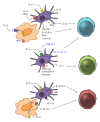Cellular factors targeting APCs to modulate adaptive T cell immunity
- PMID: 25126585
- PMCID: PMC4122108
- DOI: 10.1155/2014/750374
Cellular factors targeting APCs to modulate adaptive T cell immunity
Abstract
The fate of adaptive T cell immunity is determined by multiple cellular and molecular factors, among which the cytokine milieu plays the most important role in this process. Depending on the cytokines present during the initial T cell activation, T cells become effector cells that produce different effector molecules and execute adaptive immune functions. Studies thus far have primarily focused on defining how these factors control T cell differentiation by targeting T cells themselves. However, other non-T cells, particularly APCs, also express receptors for the factors and are capable of responding to them. In this review, we will discuss how APCs, by responding to those cytokines, influence T cell differentiation and adaptive immunity.
References
-
- Kaye J. Niche marketing: regulation of the homeostasis of naive CD4+ T cells. Nature Immunology. 2009;10(2):136–138. - PubMed
-
- Gately MK, Renzetti LM, Magram J, et al. The interleukin-12/interleukin-12-receptor system: role in normal and pathologic immune responses. Annual Review of Immunology. 1998;16:495–521. - PubMed
-
- Thierfelder WE, van Deursen JM, Yamamoto K, et al. Requirement for Stat4 in interleukin-12-mediated responses of natural killer and T cells. Nature. 1996;382(6587):171–174. - PubMed
Publication types
MeSH terms
Substances
Associated data
Grants and funding
LinkOut - more resources
Full Text Sources
Other Literature Sources
Miscellaneous


